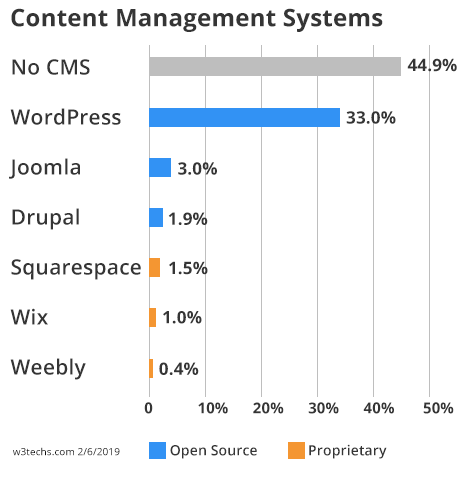Why Choose ClassicPress for Your Business / Professional Website CMS?

As the newcomer business-grade CMS, ClassicPress has a lot to prove. WordPress is the dominant CMS, currently powering more than 30% of all websites (60% of websites built on a CMS); for some perspective, see the chart. As a fork of WordPress, ClassicPress plans to capitalize on what we believe is a misstep for business and professional users in WordPress’s decision to integrate the block editor into core (originally introduced as the Gutenberg plugin).
ClassicPress v1.0.0 will be the beginning of a Long-Term Support stable release series, including all changes from WordPress 4.9.9 as a starting point. We’ll continue to release security updates and bug fixes in future 1.x versions, as well as maintaining full backwards compatibility with the WordPress 4.9 branch. (Related thoughts on longevity near the end).
When deciding on a CMS, I believe businesses and professional organizations should look at the following factors: who owns the platform (open-source vs proprietary); flexibility and extensibility; developer availability; security; SEO support; ease of use; and prospects for longevity.
Open-source vs. Proprietary
Open-source CMS solutions (ie, WordPress, ClassicPress, Joomla, Drupal) offer a great deal of freedom to do what you wish with the software on whatever hosting platform best suits your needs, while proprietary solutions generally allow only their own ready-made solutions on their own hosting platforms. While proprietary solutions (ie, Squarespace, Wix, Weebly) can be a good choice for certain kinds of business websites (eg, brochure-ware), their limitations make them a poor choice for most. It’s no accident that open-source platforms dominate the business CMS market.
Flexibility and Extensibility
Historically, flexibility and the ability to extend its capabilities have been major advantages for open source platforms like WordPress and ClassicPress. Any good developer can use them to produce websites that meet virtually any business need, in no small part because these sites are usually hosted independently, and the software can modified to suit. Squarespace, Wix, and Weebly platforms are not open-source, which means their platforms cannot be modified if you need something they don’t offer.
What currently gives WordPress the extensibility edge over other open-source platforms is a large number of third-party plugins that can provide features without having a highly-skilled developer on board.
Notably, at least until WordPress drops support for Classic Editor (end of 2021?), most plugins that work with WordPress will also work with ClassicPress. Enthusiasm for ClassicPress is growing among developers and we are optimistic that a robust plugin ecosystem will evolve.
Developer Availability
Developer availability is something businesses and professional organizations must consider. The more competent developers available, the more likely they can found and hired, and the more affordable their services. Because the block editor is React.js-based, it’s a departure from previous WordPress technology, and relatively few WordPress developers are competent to work with it yet.
The ClassicPress developer pool is actually much larger, because all competent WordPress developers are also competent ClassicPress developers by default (this also bodes well for ClassicPress plugin and theme development).
Security
Security of any system is only as strong as its weakest link. None of the platforms are ‘bad’ at security out of the box. However, while open-source platforms’ major strength is flexibility, this strength is also a potential weakness, as modifications made utilizing poor security practices can create a bad situation.
Likewise, poorly developed plugins can increase security risks or create conflicts with existing site features. To select, configure, and customize plugins while keeping security risks low, the judgement and experience of competent and savvy developers is highly recommended.
ClassicPress shares the same core code as WordPress and has committed to a “security first” approach to development. What this means to our users is that they will enjoy the same level of security available to them as a WordPress user, but as we develop past v1, our security team will actively seek ways to improve and make CP a “best choice” for business websites.
SEO Support
Much like security, SEO for a website is only as strong as the people managing it. It’s important to realize that underpinning any SEO effort, there must be a well-thought-out program of content production. Any SEO support applied to a site that produces no content is useless. That said, WordPress (and ClassicPress) benefit from several good SEO plugins that, in the hands of content producers who know what they’re doing, can boost SEO significantly.
Ease of Use
It’s worth remembering the original purpose of Content Management Systems: enabling website owners to quickly and easily add and update content on their websites. Historically, WordPress has held an advantage in this area (it’s a major factor in why Drupal fell behind WordPress). In the last few years, however, some of the proprietary platforms have implemented drag-and-drop interfaces that cater to low-end users, and WordPress decided it needed to do something to ‘keep up.’ The Gutenberg plugin (integrated into core as the block editor with the 5.0 release) was the result of those efforts, promising a fun and flexible (layout/design) editing experience. Although it may improve in time, at launch the block editor is buggy and difficult to work with.
But in business or professional settings, the goal in managing content is neither to have fun nor to have a lot of layout/design options. The goal is to add or update content quickly and easily so a business owner or employee can move on to the other 99 things on their daily to-do list. The block editor is significantly more difficult to use for simple edits, and having the flexibility to design pages is not only a time-suck, but presents a risk to branding and consistency. A system of professionally designed templates and custom fields (with an easy-to-use text editor) is much better able to help businesses meet their content management goals while maintaining consistency in branding.
ClassicPress not only retains the classic editor, but has committed to making improvements after v1.0.0 that will better serve CMS users in business and professional organizations. From a business CMS perspective, it really doesn’t matter if the block editor becomes less buggy: it’s the wrong tool for the job.
Prospects for Longevity
WordPress has an impressive track record, but it started even smaller than ClassicPress — with two developers — in 2003. Intended as a way for its founder to share photos with friends and family, it almost unwittingly became the dominant CMS by developing features that allowed developers to customize it (ie, custom post types, custom fields) and by encouraging and enabling an ecosystem of third-party plugins and themes. ClassicPress intends to build on what we believe WordPress did right, making improvements that make it an even better CMS.
Those of us involved with ClassicPress are deeply committed. We know how much work is in front of us, but we also know we’re up to the challenge. With every ClassicPress site launched, with every new volunteer, with every third-party plugin or theme that commits to continued support, ClassicPress moves toward its goal to become the CMS of choice for business and professional organizations.
Want to help out? Head over to our Slack workspace classicpress.net/join-slack/, and/or our forums at forums.classicpress.net.


Thanks for this great article, Ray! Social media posts have gone out on this as well.
Thanks Michelle!
Great article Ray.
Thanks!
Thanks, this is a good overview.
I have a question: what is the difference between using ClassicPress, and just sticking with WP 4.9.x?
In other words, how long can we get away with sticking with 4.9.x do you think?